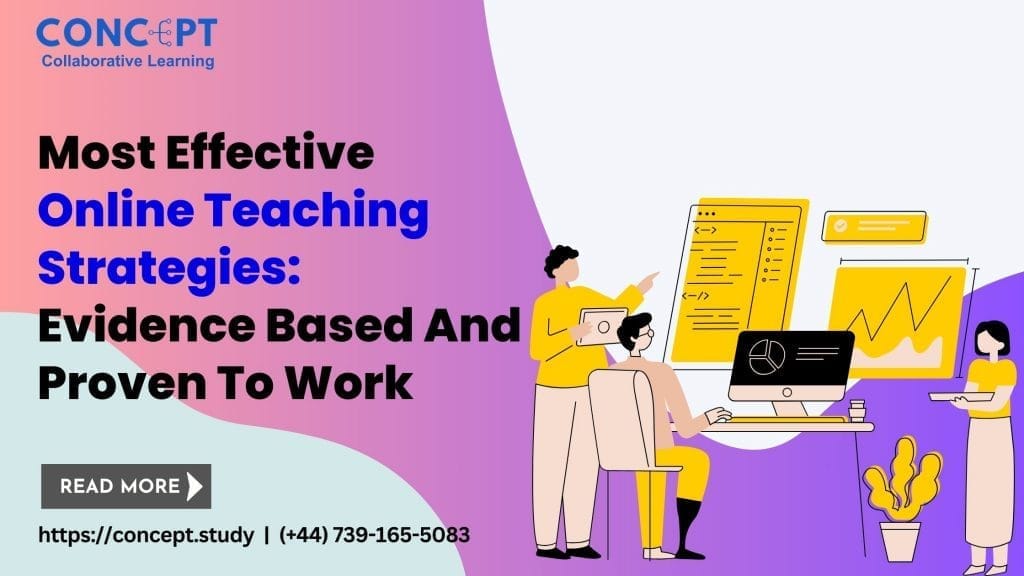
Most Effective Online Teaching Strategies: Evidence Based And Proven To Work
Online education has become an integral part of the contemporary learning landscape, offering both challenges and opportunities for educators. As we navigate this digital frontier, it is crucial to employ teaching strategies that are not only evidence-based but also proven to be effective in the online environment.
In the virtual realm, the role of educators extends beyond traditional methods. Effective teaching in online settings requires a dynamic approach that engages students and fosters a conducive learning atmosphere. Let’s delve into the most effective teaching strategies that have been demonstrated to work in the online teaching landscape.
Understanding the Online Learning Landscape
Online education brings with it a set of unique challenges, such as the absence of physical interaction and the reliance on technology. However, it also provides the opportunity for flexible learning and the integration of diverse resources. Acknowledging the distinct nature of online learning is the first step towards tailoring effective teaching strategies.
01. Foundations of Effective Teaching
Building a strong foundation is essential for successful online teaching. Clear communication, well-organized course structures, and establishing a positive online community contribute significantly to the overall learning experience. Students are more likely to succeed when they feel supported and connected in their virtual learning environment.
02. Active Learning Techniques for Online Classes
The days of passive online lectures are long gone. Integrating active learning techniques into virtual lessons keeps students engaged and enhances their understanding of the subject matter. From interactive quizzes to group discussions, educators have a myriad of tools at their disposal to make online learning an interactive and participatory experience.
03. Adapting Traditional Teaching Methods
While the shift to online teaching may seem daunting, many traditional teaching methods can be successfully adapted to the virtual classroom. Striking the right balance between synchronous and asynchronous learning ensures that students receive a well-rounded educational experience. Give a read Christmas Gifts for your kids that encourage learning
04. Utilizing Multimedia for Enhanced Learning
Incorporating multimedia elements into online courses caters to different learning styles. Videos, podcasts, and visual aids not only make learning more enjoyable but also increase retention. As educators, leveraging multimedia resources is a powerful way to enhance the overall quality of online education.
05. Assessment and Feedback Strategies
Effective assessment methods are crucial for evaluating student comprehension and progress. Online assessments should be well-designed and aligned with learning objectives. Additionally, providing timely and constructive feedback helps students understand their strengths and areas for improvement.
06. Building Community in the Virtual Classroom
Fostering a sense of community is vital for online learners. Educators can create forums, discussion boards, and collaborative projects to encourage interaction among students. A connected virtual community enhances engagement and contributes to a more enriching learning experience.
07. Addressing Challenges and Overcoming Obstacles
Online teaching is not without its challenges. Technical issues, lack of engagement, and communication barriers can pose obstacles. However, proactive measures, such as troubleshooting guides and regular check-ins, can help educators address and overcome these challenges effectively. Check out Online GCSE Courses in UK
08. Cultivating Student Motivation
Motivating students in the online setting requires creativity and intentionality. Recognizing achievements, setting realistic goals, and incorporating elements of gamification are effective strategies to keep students motivated and invested in their learning journey.
09. Incorporating Real-World Applications
Connecting theoretical concepts to real-world applications enhances the practical relevance of online lessons. Case studies, real-world examples, and virtual simulations provide students with a deeper understanding of how their learning applies to the world around them.
10. Professional Development for Online Educators
As the landscape of online education evolves, continuous professional development is essential for educators. Staying updated on the latest tools, methodologies, and pedagogical approaches ensures that online educators are well-equipped to deliver high-quality instruction.
11. Ensuring Accessibility and Inclusivity
Designing courses with accessibility in mind is a fundamental aspect of online education. Educators must consider diverse learning needs and provide accommodations to ensure that the virtual learning environment is inclusive for all students.
12. Measuring Success: Analytics and Improvement
Data analytics play a crucial role in evaluating the effectiveness of teaching strategies. Educators can utilize analytics tools to gather insights into student performance, engagement levels, and course effectiveness. This data-driven approach allows for continuous improvement and refinement of online courses.
Conclusion
In conclusion, effective online teaching goes beyond the transfer of information; it involves creating an engaging and supportive learning environment. By understanding the unique challenges of online education and implementing evidence-based strategies, educators can empower students to succeed in the digital era. Find experienced Eleven plus tutors near me
FAQs
Q1. How can I keep online students engaged during virtual lessons?
Utilize interactive tools, incorporate multimedia, and encourage active participation through discussions and group activities.
Q2. What are the key challenges in online teaching, and how can they be addressed?
Common challenges include technical issues and lack of engagement. Address them by providing clear instructions, offering technical support, and fostering a sense of community.
Q3. Is professional development necessary for online educators?
Yes, continuous professional development ensures that educators stay informed about the latest trends, tools, and pedagogical approaches in online education.
